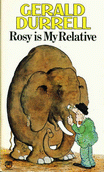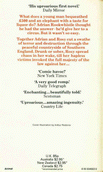Rosy Is My Relative
Read Rosy Is My Relative Online
Authors: Gerald Durrell




What does a young man bequeathed £500 and an elephant with a taste for liquor do? Adrian Rookwhistle thought he had the answer–he’d give her to a circus. But it wasn’t so easy.
Together Adrian and Rosy cut a swathe of terror and destruction through the peaceful countryside of Southern England. Drunk or sober, Rosy spread chaos in her wake, till her hapless victims invoked the full majesty of the law against her . . .
Rosy, the elephant bequeathed to young Adrian Rookwhistle by a reprobate relative, turns out to be a handful; not only because of her size but also because of her fondness for strong drink. To Adrian she represents the chance to get away from a city shop and a suburban lodging by exploiting her theatrical talent and experience. To Rosy their progress towards the gayer South Coast resorts offers undreamed-of opportunities for drink and destruction.
So the Monkspepper Hunt is driven to delirium and Lady Fenneltree’s stately home reduced to a shambles. In due course the constabulary catches up with the pair, whose ensuing trial is a triumph of the law and of Rosy’s enormous charm. The verdict is–but then the story has to be read to be believed, if then.
In spite of all this the author firmly maintains that his first novel is entirely credible, further that it is “an almost true story”!
Available in Fontana by the same author
Birds, Beasts and Relatives
Two in the Bush
Beasts in My Belfry
Catch Me a Colobus
Fillets of Plaice
The Stationary Ark
Gerald Durrell
Fontana/Collins
First published 1968
First issued in Fontana Books 1969
Eleventh Impression August 1978
© Gerald Durrell 1968
Made and printed in Great Britain by William Collins Sons & Co. Ltd. Glasgow
CONDITIONS OF SALE: This book is sold subject to the condition that it shall not, by way of trade or otherwise, be lent, re-sold, hired out or otherwise circulated without the publisher’s prior consent in any form of binding or cover other than that in which it is published and without a similar condition including this condition being imposed on the subsequent purchaser
1. THE ABOMINABLE ACTION OF AN UNCLE
2. THE INTERMINABLE WAIT
3. THE SHOCKING ARRIVAL
4. THE OPEN ROAD
5. THE MONKSPEPPER HOLOCAUST
6. THE ARISTOCRATIC ENTANGLEMENT
7. PEACOCKS AND PEACHES
8. THE PARTY
9. THE FLIGHT
10. THE “UNICORN AND HARP”
11. HUE AND CRY
12. THE DEPARTURE
13. THE SEA VOYAGE
14. LANDFALL
15. THE REHEARSAL
16. FIRST NIGHT
17. THE APPROACH OF THE LAW
18. THE LAW
19. THE LAW WORKING
20. FINAL SETTLEMENT
21. THE VERDICT
ALTHOUGH MANY PEOPLE will not believe me, I would like to place it on record that this is an almost true story. By this I mean that Rosy and Adrian Rookwhistle really did exist. I had the privilege of meeting Rosy myself. Nearly all the adventures described in this book really happened. I have merely embroidered and polished here and there.
I am deeply indebted to Miss Eileen Molony, for it was she who first drew my attention to Rosy and Adrian Rookwhistle, and so provided the recipe for this fairy story.
I would also like to thank Lord Coutanche, Sir Robert Le Masurier, Bailiff of Jersey, and Mr. Cutland the Bailiff’s Secretary for allowing me to attend the Royal Court in St. Helier in order to gather what authors normally rather pompously call atmosphere. I am also grateful to Mr. John Langin for reading the relevant portions of the book and keeping me straight on legal procedure. I would hasten to add, however, that my interpretation of the law bears absolutely no resemblance to the way that justice is dispensed in Jersey.
My thanks also to Mr. Swanson who allowed me to go behind the scenes of the Royal Opera House and who gave me many fascinating details about its history.
Mr Douglas Matthews of the London Library went to a great deal of trouble to find me books dealing with the period. Again I would like to state that if I have gone wrong anywhere, the mistake is mine and not his.
Last, but certainly not least, I would like to thank my secretary, Miss Doreen Evans, who before coming to me was appropriately enough, secretary to a Coroner and Clerk to the justices, and gave me useful information during the writing of this book.
Unaware that doom was overtaking him, Adrian Rookwhistle, in his shirt sleeves, was occupied in making faces at himself in his looking-glass. At seven o’clock every morning Adrian would stand in his attic bedroom and commune thus with his reflection. The mirror was a large one with a wide gilt frame, and its surface was grey and pitted, like a tired iced pond at the end of a hard winter. It reflected both Adrian and his room in a sort of greyish haze, as though the whole scene was being viewed through a large cobweb. Adrian gazed at his reflection with some animosity.
“Thirty years!” he said, accusingly, “Thirty years . . . half your life gone And what have you seen? What have you done? Nothing!”
He glared at himself in the mirror, disliking his unruly dark hair that no amount of water would flatten, his large, rather soulful dark eyes and his wide mouth. It was, he decided, a thoroughly unattractive face. He lowered his lids fractionally, moulded his mouth into the nearest approach to a sneer that it was capable of, and breathed deeply through his nose so that his nostrils flared out in the most satisfactory way.
“Sir,” he snarled through clenched teeth, “unhand the lady or I will be forced to deal with you. Ignorant though you are, you cannot be unaware of the fact that I am the finest swordsman outside France.”
He paused and stared at his reflection; he had to confess that, even allowing for his natural prejudice, he did not look like the finest swordsman outside France. Adventure, he had decided some time ago, was what he really craved, but it seemed that adventure so seldom came to people with his sort of face. There
had
been one occasion (and he blushed now even to think of it) when he had seized what he thought to be his great opportunity and had stopped what he assumed to be a runaway horse-drawn bus. It transpired that the bus was in fact a horse-drawn fire engine performing an errand of mercy. The broken leg he had sustained was a mere nothing compared to the reprimand that the Magistrate had given him, and the fact that the shop that was on fire had been burnt to the ground.
Adrian was the product of a union between the Reverend Sebastian Rookwhistle and Rowena Rookwhistle. His parents bad conceived him–in a moment of mental aberration–during the wane of a long and extremely dull married life entirely devoted to carrying out God’s commands. For a long time, indeed, Adrian was under the impression that his father was the only man in the country who had direct access to the Almighty. Adrian’s appearance in the world had been treated by his father with a certain embarrassment, and by his mother with an air of pleased surprise.
His upbringing in the village of Meadowsweet, had been so placid, so blameless and so dull that Adrian had difficulty in remembering anything about it at all. Meadowsweet was one of those tiny, remote hamlets where conversation was confined to meteorological or agricultural subjects, conducted in a series of inarticulate grunts, and where the greatest excitement of the day was the earth-shattering recollection that ten years previously Farmer Raddle’s cow had given birth to twin calves. Here Adrian grew up, and his only entertainments were bell-ringing, tea parties at the vicarage once a week, and visit, to those sick members of the local peasantry who were too weak to fend off the ponderous patronage of the Reverend Rookwhistle.
When Adrian had reached the age of twenty, his father and mother were removed from this world in one fell swoop, the Almighty (in one of his more absent-minded moments) having failed to inform the Reverend Rookwhistle that the bridge between the villages of Meadowsweet and Hellebore had been washed away. So Adrian was deprived of mother, father and vicarage. His father’s savings turned out to be so modest as to be almost non-existent, and it beacame obvious that Adrian would have to work for his living. So, in the brilliant summer of 1890, armed with a letter of introduction from one of his father’s friends, he made his way to the great, sprawling, rattling, jingling, smoke-shrouded City, and there became a clerk in the highly respectable establishment of Bindweed, Cornelius and Chunter, purveiors of green groceries to Ladies and Gentlemen of Quality. Here he had spent ten hardworking but uneventful years on the princely salary of fifteen shillings a week. But Adrian felt that there was more to life than being enshrined for ever in the emporium of Bindweed, Cornelius and Chunter. Recently this problem had been occupying his mind to the exclusion of practically everything else, and he talked about it to his reflection in the minor:
“
Other
people,” he muttered as he paced up and dawn his room, with an occasional sideways glance at the mirror, to make sure he was still there, “
other
people lead exciting. interesting lives. They have extraordinary things happen to them . . . they have
adventures
. Why can’t they happen to me?”
He squared up to the minor again. His eyelids drooped. He sneered.
“I have warned you, sir,” he said, his voice quivering with ill-concealed passion, “unhand that lady or ’twill be the worse for you.”
He made a vague chopping motion with his hand that knocked his hair-brush on to the floor.
So occupied was he with his own thoughts that he had been unaware of the slow, strange thumping and wheezing noise which should have warned him that his landlady was making one of her infrequent sorties to the attic. A thunderous knocking on the door made him jump so badly that he dropped his imaginary sword.
“Are you there, Mr. Rookwhistle?” enquired Mrs. Lavinia Dredge in her trenchant baritone, as if it were the last place in the world that she expected to find him.